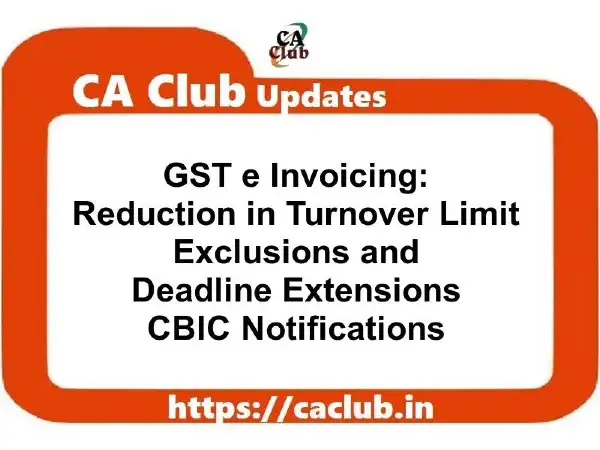CBIC announces a further reduction in the aggregate turnover threshold limit, from Rs 10 crore to Rs 5 crore, for ‘e invoicing’ of B2B transactions, effective 01/08/2023, i.e. ‘e-invoicing’ made mandatory for more taxpayers with turnover above Rs 5 crores, as part of the initiative to replace physical invoices with ‘e-invoices,’ which will eventually help in dispensing with the e-way bill system.
CBIC has previously issued various Notifications regarding ‘e Invoicing’ Requirements, Exclusions, Exemptions, Deadline Extensions and so on.
Further Reduction in Turnover Limit and Timeline Extension for GST e Invoicing Requirements
CBIC Central Tax Notification 10/2023 dt. 10/05/2023: CBIC announces a further reduction in the aggregate turnover threshold limit from Rs 10 crore to Rs 5 crore for ‘e invoicing’ of B2B transactions, effective August 1, 2023.
CBIC Central Tax Notification 17/2022 dt. 01/08/2022: CBIC announces a further reduction in the aggregate turnover threshold limit from Rs 20 crore to Rs 10 crore for ‘e invoicing’ of B2B transactions, effective October 1, 2022.
CBIC Central Tax Notification 1/2022 dt. 24/02/2022: CBIC notifies further reduction in the threshold limit of aggregate turnover from Rs 50 crore to Rs 20 crore for implementation of GST provisions relating to e invoicing of B2B transactions by certain specified class of registered persons, w.e.f. 01/04/2022.
CBIC Central Tax Notification 5/2021 dt. 08/03/2021: CBIC notifies further reduction in the threshold limit of aggregate turnover from Rs 100 crore to Rs 50 crore for implementation of GST provisions relating to e invoicing of B2B transactions by certain specified class of registered persons, w.e.f. 01/04/2021.
Govt. Departments/ Local Authorities excluded from GST e Invoicing Requirements
CBIC Central Tax Notification 23/2021 dt. 01/06/2021: CBIC notifies exemption/ exclusion of the ‘Government departments and Local Authorities’ from the requirement of GST provisions relating to issuance of e-invoice for B2B transactions.
Reduction in Turnover Limit and Timeline Extension for GST e Invoicing Requirements
CBIC Central Tax Notification 88/2020 dt. 10/11/2020: CBIC notifies reduction in the threshold limit of aggregate turnover of Rs. 500 crore to Rs. 100 crore, for implementation of GST provisions relating to e invoicing of B2B transactions by certain class of registered persons, w.e.f. 01/01/2021.
Exports included for GST e Invoicing Requirements
CBIC Central Tax Notification 70/2020 dt. 30/09/2020: CBIC includes ‘Exports’ for the purpose of implementation of requirements of e invoicing under GST, which were so far applicable to ‘supply of goods or services or both’ by certain specified class of registered persons, in terms of CGST Rule 48(4). Also the criteria of aggregate turnover in a ‘financial year’ has been amended to turnover in ‘any preceding financial year from 2017-18 onwards’.
SEZ Units excluded and Threshold Turnover Limit increased for GST e Invoicing Requirements
CBIC Central Tax Notification 61/2020 dt. 30/07/2020: CBIC further excludes/ exempts SEZ Units from the class of registered persons required to implement GST e-invoicing provisions. Also, the threshold limit of Rs. 100 crores turnover has been increased to Rs. 500 crore turnover.
Insurance company, Banking company including NBFC, Financial Institution, Goods/ Passengers Transporters, Cinema Halls/ Multiplexes, etc. excluded from GST e Invoicing Requirements
CBIC Central Tax Notification 13/2020 dt. 21/03/2020: CBIC notifies extension upto 01/10/2020, of deadline for commencing preparation of e-invoice/ other documents, in line with CGST Rule 48(4), in respect of supply of goods/ services by certain registered persons having aggregate turnover of above Rs. 100 crores, as against the earlier prescribed deadline of 01/04/2020. Also CBIC excludes/ exempts the class of registered persons referred to in sub-rules (2), (3), (4) and (4A) of CGST Rule 54 (i.e. Insurance company, Banking company including NBFC, Financial Institution, Goods/ Passengers Transporters, Cinema Halls/ Multiplexes, etc.) from e-invoicing requirements.
GST e Invoicing Requirements Applicable from 01/04/2020
CBIC Central Tax Notification 70/2019 dt. 13/12/2019: CBIC notifies the class of registered persons (having turnover exceeding Rs. 100 crore in a financial year) who shall comply with the e invoicing requirement (i.e. preparing invoice electronically at the GST portal) for B2B supplies of goods or services or both, w.e.f. 01/04/2020, in terms of CGST Rule 48(4), as recommended by the GST Council.
Related Posts:
e-Invoice Exemption Declaration Functionality: GSTN Advisory
GSTN Advisory on Enablement Status of Taxpayers for e-Invoicing
CGST Rule 48: Manner of Issuing Tax Invoice [CGST Rule 48(4) for e-Invoice]
CGST Rule 54: Tax Invoice in Special Cases [Excluded class of registered persons referred to in sub-rules (2), (3), (4) and (4A) of CGST Rule 54, from e Invoicing requirement]
GST e-Invoicing Turnover Limit not reduced to Rs 5 Crore from 01/01/2023: CBIC
We have two branches in two states and both branches have not exceeded turnover of Rs. 20 crore separately. Do we need to follow requirements relating to e-invoicing as are applicable from 01/04/2022 for taxpayers having turnover above Rs. 20 crores?
In short, from August 1, 2023, traders must prepare e-invoices for B2B transactions, in respect of supply of taxable goods and services, as well as for credit/debit notes, where they have reported an aggregate annual turnover above Rs 5 crore in any financial year from 2017-18 onwards. To comply with the requirement and avail ITC, the traders should register before August 1, 2023.
It’s important to note that e-invoicing is not applicable or exempted in the case of businesses who handle non-taxable goods under the GST laws. Additionally, certain entities, including SEZ units, insurance, the banking sector (including non-banking financial companies), goods transporting agencies and passenger transport services have been exempted from the purview of e-invoicing.